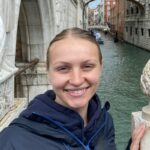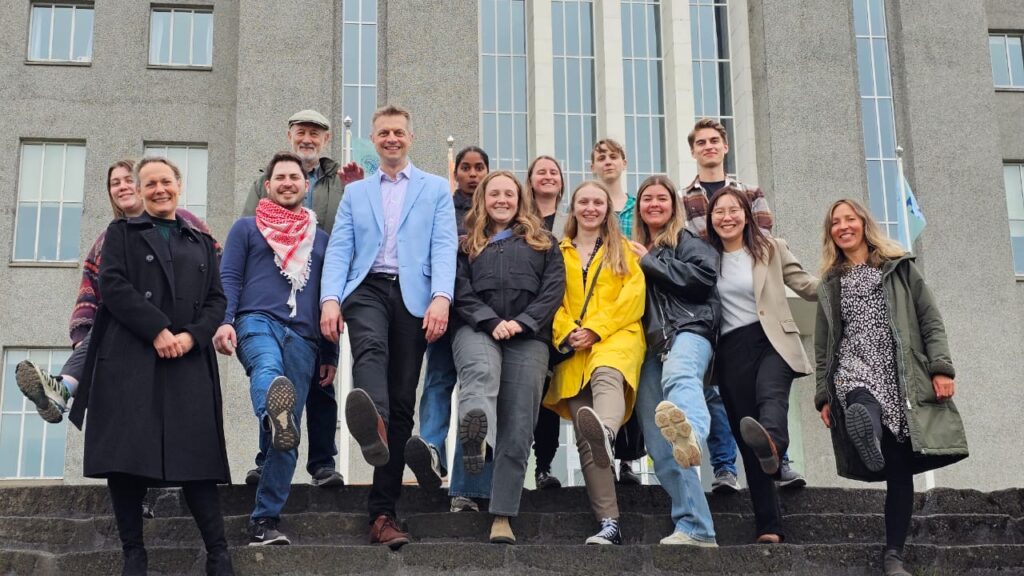
By Peri Dworatzek
IEFLL Partnership Coordinator
PhD Student at York University
September 2025
This past June (2025), members of the International Ecological Footprint Learning Lab (IEFLL) from York University traveled to Iceland to meet with IEFLL members based in Iceland. This week-long symposium was the first opportunity for York University and University of Iceland researchers, faculty, and students to meet in-person, after having virtually worked together for a couple years. This visit strengthened international networks between IEFLL partners, showcased ongoing and future research funded by the IEFLL partnership, and enhanced relationships between York University and the University of Iceland.
The IEFLL partnership is an international, multistakeholder partnership bringing together academics and practitioners to quantify and track global and regional sustainability through the use of ecological footprint and biocapacity metrics. Graduate students at York University and the University of Iceland are trained in sustainability informatics to be able to access and clean large datasets and analyzing and visualizing important information. Through IEFLL, students and researchers produce the National Ecological Footprint and Biocapacity Accounts (NEFBA) – a large dataset containing Ecological Footprint and Biocapacity data for every country in the world on a timeline from 1961 to 2024.

From left to right, back row: Anne Louise Van Berkum², Peter Victor¹, Bumika Srikanthalingam¹, Petra Dimitrova Toneva², Jade², Matthew Don Reimer Dyck²; front row: Brynhildur Davíðsdóttir², Andrew Reeves¹, Eric Miller¹, Beatrice Foley¹, Peri Dworatzek¹, Rakel Halldórsdóttir², Kiona Lo¹, and Marina Ermina².
Affiliations: ¹York University, ²University of Iceland
Strengthening international networks with IEFLL partners
During the Biennial Symposium, members from York University and the University of Iceland visited the operations of non-academic Icelandic IEFLL partners. These site visits were opportunities for academic and non-academic partners to exchange information, learn more about the work each other is doing, and consider how to better align the ecological footprint data and IEFLL research agenda with their partners.
The first visit was to the Orkuveita Reykjavíkur (Reykjavík Energy) geothermal park. Reykjavík Energy provides residents, businesses, and others with geothermal powered electricity, heating, and water among other utilities. In their geothermal park they partner with other companies such as Carbfix, Climeworks, and VAXA Technologies that aim to reduce the amount of carbon dioxide in the atmosphere. Carbfix injects carbon dioxide into basaltic rocks by dissolving it in water, Climeworks innovates on direct carbon capture technology, and VAXA Technologies vertically farm algae using carbon dioxide and waste heat and water from the power plant. Our team considered these innovative technologies and how it would be possible to incorporate this type of carbon sequestration into the ecological footprint data and what impact these technologies have on biocapacity.

York University and University of Iceland IEFLL researchers and students visiting the borehole that sends carbon dioxide into the basaltic rocks 2000 meters in the ground, operated by Carbfix.

York University and University of Iceland IEFLL researchers and students visiting climeworks carbon dioxide sequestration technologies.

York University and University of Iceland IEFLL researchers and students visiting VAXA technologies, viewing their algae production technology.
The next day we visited our public partners, officials in the City of Reykjavík. Members of our team, Eric Miller (director of the Ecological Footprint Initiative at York University and co-director of IEFLL), Peri Dworatzek (York University PhD Student and IEFLL partnership coordinator) and Rakel Halldórsdóttir (University of Iceland Masters student), gave a presentation on research being done to scale ecological footprint and biocapacity to the city level. This included the examples of city-scale footprints in Ontario and ongoing research by Rakel to scale ecological footprint to Reykjavík. Our last site visit was to the Iceland Ocean Cluster, an innovative research and technology hub, that brings together companies aiming to reduce fish waste from the fishing industry. Our researchers and students considered how these products and technologies would impact the fishing ground component of ecological footprint, along with the limitations of promoting competitive market-based solutions to reducing the impact of the fishing industry.

From left to right: Rakel Halldórsdóttir (University of Iceland), Peri Dworatzek (York University), and Eric Miller (York University) presenting to officials at the City of Reykjavík about city scaled ecological footprint and biocapacity accounts.

York University and University of Iceland IEFLL researchers and guests visiting the Icelandic Ocean Cluster innovation hub. Researchers are pointing at a sign on the wall that says, “Zero footprint vessel”, a goal that the Ocean Cluster is trying to reach. From left to right, back row: Shanta Varma, Bumika Srikanthalingam¹, Eric Miller¹, Beatrice Foley¹, Anne Louise Van Berkum², Brynhildur Davíðsdóttir², Matthew Don Reimer Dyck², Marina Ermina², Jade², Maria Victor, Peter Victor¹, Kiona Lo¹, Peri Dworatzek¹, Andrew Reeves¹, and Petra Dimitrova Toneva².
Affiliations: ¹York University, ²University of Iceland
Showcasing ongoing and future research
For the past two years researchers and students from York University and the University of Iceland have been working across time-zones to produce yearly editions of the National Ecological Footprint and Biocapacity Accounts (NEFBA). The first event of the symposium marked a special occasion as it was the first in-person NEFBA production day between both universities. The event was kicked off with a warm welcome and introductions from Silja Bára Ómarsdóttir, the Rector of the University of Iceland; Hafdís Hanna Ægisdóttir, the Head of the Sustainability Institute, and the Chair of the Environment and Natural Resources Program. Following that, the Director of the Ecological Footprint Initiative, Eric Miller, detailed the progress in the ongoing production of the 2026 edition of the NEFBA.

Presentation by Hafdís Hanna Ægisdóttir (Head of the Sustainability Institute at the University of Iceland) to the IEFLL York University and University of Iceland students and researchers.
Later on in the week, an open seminar was co-organized by the Festa Center for Sustainability, the Sustainability Institute at University of Iceland, and the department of Environment and Natural Resources at University of Iceland. This seminar included a presentation on Iceland’s ecological footprint, titled “Uncovering Iceland’s Ecological Footprint: Data Insights/Trends, Nordic Context, and Research Opportunities”, presented by York University researchers, Eric Miller, Kiona Lo, and Peri Dworatzek. Audience members asked intriguing questions about the context and application of Iceland’s ecological footprint data, specifically regarding the extremely high fishing ground component. The presentation was followed by a panel discussion with Eric Miller; Elva Rakel Jónsdóttir, managing director at the Festa Center for Sustainability; Björn Barkarson, environmental scientist in the Ministry of the Environment, Energy, and Climate in Iceland; and Sigurður Eyberg Jóhannesson creator of the film “The Man who Shrunk his Footprint”. The panelists offered important insights to how the ecological footprint can be more widely applied for businesses and individuals in Iceland.

From left to right: Peri Dworatzek, Eric Miller, and Kiona Lo presenting on the ecological footprint and biocapacity of Iceland at the Nordic House on the University of Iceland campus.
To end the week, the IEFLL team hosted the first research symposium presentation session for IEFLL students and researchers to present their completed or ongoing research related to ecological footprint and biocapacity. The nine research presentations showcased a wide range of topics and levels of study, ranging from master’s level to doctoral level, to postdoctoral level research. The research topics ranged from methodological improvements to analysis and further applications of the data, such as incorporating satellite imagery and conducting an ecological footprint analysis in relation to waste management.

Andrew Reeves, postdoctoral researcher at York University presenting his results of the input-output analysis done to scale the ecological footprint of production and consumption to the province of Ontario.

Anne Louise Van Berkum, University of Iceland master’s student presenting the satellite imagery used in her master’s research to improve the data accuracy for built-up land biocapacity.
Enhancing relationships between York University and the University of Iceland
This series of events over the course of the week was monumental in advancing the relationships between students, researchers, and faculty at York University and the University of Iceland in the IEFLL partnership project. As these two universities are leading experts in this field it is important for strong long-lasting relationships. Over the course of the remaining five years of the partnership the two universities will continue to mutually support each other as advisors to graduate research, co-present at conferences and other events, and co-author datasets, papers, and reports.

Some of the IEFLL Leadership team in Iceland, from left to right: Peter Victor (co-director), Brynhildur Davíðsdóttir (co-director), Eric Miller (co-director), and Peri Dworatzek (partnership coordinator).

Leave a Reply
You must be logged in to post a comment.